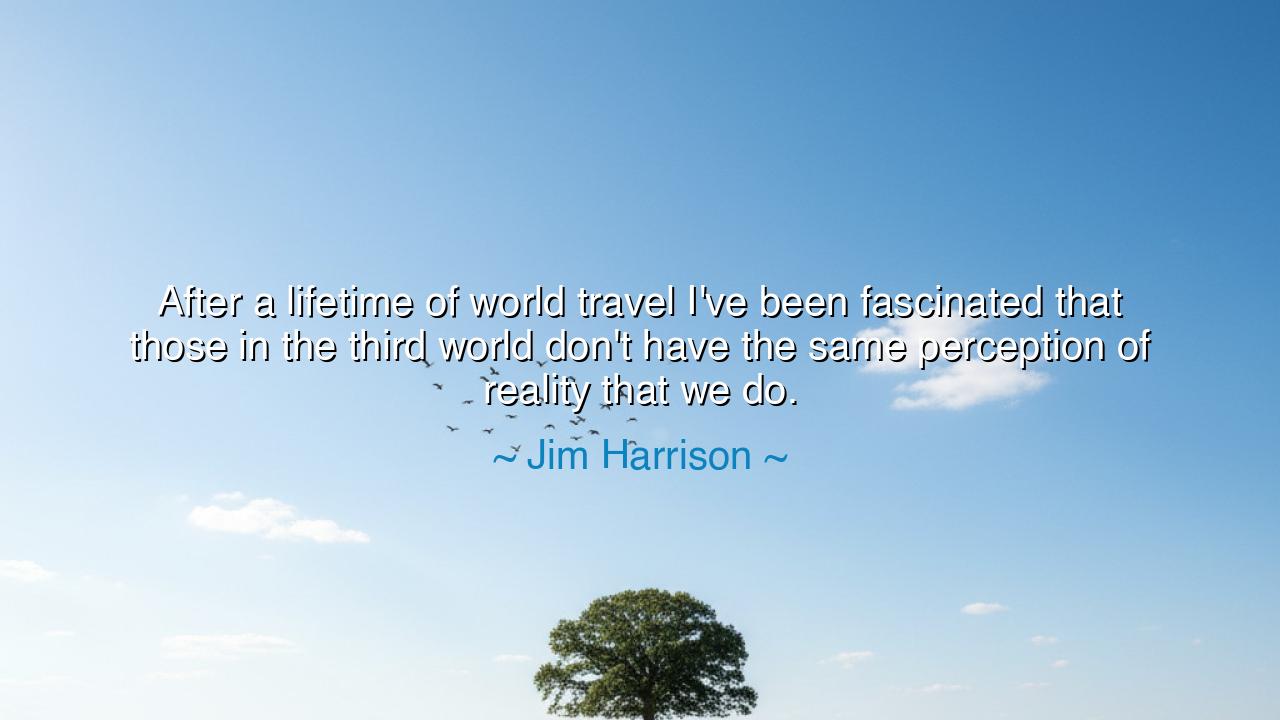
After a lifetime of world travel I've been fascinated that those
After a lifetime of world travel I've been fascinated that those in the third world don't have the same perception of reality that we do.






The words of Jim Harrison, poet of the earth and seer of the human condition, strike like a reminder carved in stone: “After a lifetime of world travel I’ve been fascinated that those in the third world don’t have the same perception of reality that we do.” Within this statement lies not judgment, but revelation—that what we call truth is often bound to the soil on which we are born, the air we breathe, and the struggles that shape our days. The traveler, by stepping beyond the narrowness of his homeland, discovers that reality is not a single river, but many streams flowing in different directions.
From the dawn of time, men believed their own customs, beliefs, and ways of life to be the measure of existence. Yet the wise who wandered—pilgrims, prophets, and merchants—learned that the world is made of countless perceptions, each shaped by need, by scarcity, by abundance, by history, and by faith. What seems certain to one people may appear strange or foolish to another. Harrison, having roamed across continents, confesses his awe at this truth: that to live in a place of struggle, as many in the third world do, is to see the world through a lens far different from the abundance of the privileged.
The meaning of the quote is not to diminish either side, but to awaken us to humility. Those who dwell in wealth may see life as a ladder of ambition, of luxury, of future planning. But those in poverty often live in the immediacy of survival, of community reliance, of traditions that hold them steady when resources fail. Thus their reality is shaped less by the illusion of control and more by the acceptance of life’s fragility. To encounter this as a traveler is to be reminded that our own perception is not universal truth, but one thread in the tapestry of human existence.
History gives us shining examples of this lesson. When Marco Polo journeyed from Venice to the courts of Kublai Khan, he encountered cities richer and more wondrous than any in Europe, and customs that overturned his notion of what was "civilized." The Europeans who read his accounts were astonished, for their perception of reality—that Europe was the center of the world—was shattered. Just as Polo’s eyes were opened by travel, so too does Harrison remind us that stepping beyond one’s boundaries unveils the infinite diversity of truth.
But there is also an echo of compassion here. To be "fascinated" is not to mock but to marvel. Harrison does not say the perception of the third world is lesser, only different—and in that difference lies wisdom. For often those who have little possess a richness of spirit, of song, of community, that those with much have forgotten. Their reality, though marked by hardship, can reveal depths of endurance, creativity, and joy that the sheltered may never know.
The lesson for us is profound: do not mistake your own way of seeing as the only way. If you are fortunate enough to travel, open your heart not only to landscapes and monuments, but to the lives and perceptions of the people who dwell there. Listen to their truths, honor their realities, and let their ways of being expand your own. For in this widening of vision lies wisdom, compassion, and the breaking of pride.
Thus, let this teaching be carried forward: reality is not a fixed wall, but a shifting mirror, reflecting the lives and struggles of those who gaze into it. The wise traveler does not insist on his own reflection, but learns to see through the eyes of others. In this way, he returns home not only with memories of places, but with the greater treasure of perspective. And this, above all, is the gift Harrison leaves us: that to walk the earth is to learn that truth is vast, and the human spirit, in all its forms, is endlessly rich.






AAdministratorAdministrator
Welcome, honored guests. Please leave a comment, we will respond soon